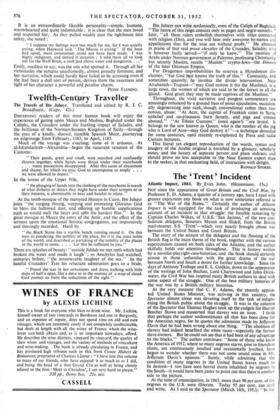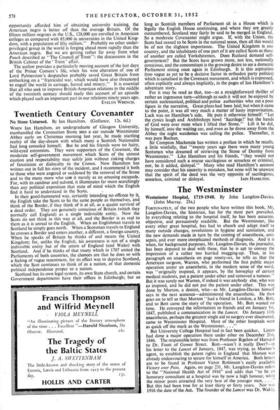The 'Trent' Incident
Atlantic Impact, 1861. By_Evan John. (Heinemann. 15s.)
NOT since the appearance of Great Britain and the Civil War, by Professor E. D. Adams, a quarter of a century ago, have I read with greater enjoyment any book on what is now sometimes referred to as "The War of the States." Certainly the author of Atlantic Impact is well equipped for the task of producing an arresting account of an incident in that struggle: the forcible removing by Captain Charles Wilkes, of U.S.S. 'San Jacinto,' of the two con- federate delegates, Senators Mason and Slidell, from the British mail-steamer S.S.`Trent'—which very nearly brought about war between the United States and Great Britain.
The story of the seizure of the delegates and the flouting of the British flag is the main theme of the book, together with the various repercussions caused on both sides of the Atlantic, and the author skilfully holds our attention throughout. This is history written by a novelist-playright-cum-historian, and the book should certainly arouse in those unfamiliar with the great drama of the war between North and South a desire for further knowledge. Since the days of Anthony Trollope and E. L. Godkin, down to the appearance of the writings of John Buchan, Lord Charnwood and John Drink- water, the Civil War has inspired many British authors to deal with some aspect of the struggle. One of the best military histories of the war was by a British military historian.
At the very moment that C. F. Adams, the recently appoin- ted United States Minister, was airiving in this country, the Spectator almost alone was devoting itself to the task of enlight- ening the British public about the struggle. It was in the columns of the Spectator that Thomas Hughes took up the cudgels for Harriet Beecher Stowe and reasserted that slavery was an issue. I think that perhaps the author underestimates all that has been done for the American negro, for he quotes the admission made by Jefferson Davis that he had been wrong about one thing. "The abolition of slavery had indeed benefited the white races—especially the former slave-owners. But he could not see that it had been of any advantage to the blacks." The author continues: "Some of those who knew the America of 1952, where so many negroes starve, pine in friendless slums, are continuously insulted and occasionally lynched, have begun to wonder whether there was not some sound sense in Mr. Jefferson Davis's opinion." Surely, while admitting that the condition of many negroes in the United States leaves much to be desired—I too have seen horrid slums inhabited by negroes in the South—it would have been juster to point out that there is another side to the picture.
At the time of emancipation, in 1865, more than 90 per cent. of the negroes in the U.S. were illiterate. Today 95 per cent. can read and write. As I said in the Spectator (March 14th, 1952): "In the opportunity afforded him of obtaining university training, the American negro is better off than the average Britain. Of the fifteen million negroes in the U.S., 128,000 are enrolled in American colleges as compared with 85,000 in universities in the United King- dom, with a population of fifty million." Probably no other under- privileged group in the world is forging ahead more rapidly than the American negro. But we are getting rather far away from what Punch described as "The Council of Trent": the discussions in the British Cabinet of the ' Trent' affair.
The author provides a particularly moving account of the last days of the Prince Consort's life, when his wise alteration of one of Lord Palmerston's despatches probably saved Great Britain from embarking on a "fratricidal war, which would have also threatened to engulf the world in carnage, hatred and misery." It is essential that all who seek to improve British-American relations in the middle of the twentieth century should study this account of an episolle which played such an important part in our relations ninety years ago.
EVELYN WRENCH.



































 Previous page
Previous page